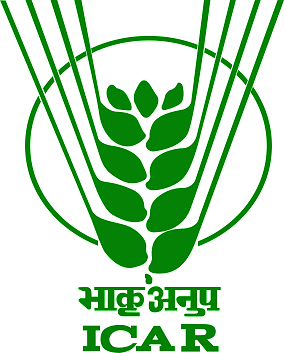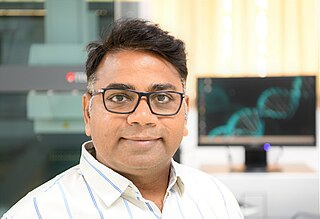
The Indian Council of Agricultural Research (ICAR) is an autonomous body responsible for co-ordinating agricultural education and research in India. It reports to the Department of Agricultural Research and Education, Ministry of Agriculture. The Union Minister of Agriculture serves as its president. It is the largest network of agricultural research and education institutes in the world.
Panagar is a town with municipality in Jabalpur district in the Indian state of Madhya Pradesh.

Swami Keshwanand Rajasthan Agricultural University (SKRAU), formerly Rajasthan Agricultural University, is a state agricultural university located in Bikaner in the Indian state Rajasthan. The university, formerly a part of the Mohanlal Sukhadia University, Udaipur became a separate entity in 1987 through Rajasthan Agriculture University, Bikaner Act, 1987. It was renamed after freedom fighter and social reformer Swami Keshwanand in 2009. Raksha Pal Singh was appointed vice chancellor in 2019.
The College of Agriculture, Pantnagar, India, is a constituent of Govind Ballabh Pant University of Agriculture & Technology, Pantnagar. It was opened on 17 November 1960 when Jawaharlal Nehru, the first Prime Minister of India, inaugurated the university. It has a triple mandate of teaching, research and extension.

Agropedia was an online knowledge repository for information related to agriculture in India. It included universal meta models and localized content for a variety of users with appropriate interfaces built in collaborative mode in multiple languages. This national portal, designed as an "agricultural Wikipedia" hosts wide range of agricultural information on a variety of crops, with an aim to empower farmers with crop information.
Vaidhyanathaswamy Santhanam was an Indian cotton scientist who worked for the Food and Agriculture Organization of the United Nations as a long term resident expert for cotton and project leader in Myanmar. He had served as a short term consultant to Vietnam as well. He was chairman of the expert review team of the Southern India Mills Cotton Development and Research Association from November 2009 to March 2010. He was also the author/co-author of over 110 publications, including books and book chapters on cotton.

The National Academy of Agricultural Research Management is a national-level service training institute for ARS cadre located in Hyderabad, Telangana, India.

Rajeev Kumar Varshney is an Indian agricultural scientist, specializing in genomics, genetics, molecular breeding and capacity building in developing countries. Varshney is currently serving as Director, Western Australian State Agricultural Biotechnology Center; Director, Centre for Crop & Food Innovation; and International Chair in Agriculture & Food Security with the Food Futures Institute at Murdoch University, Australia since Feb 2022. Before joining Murdoch University, Australia he served International Crops Research Institute for the Semi-Arid Tropics (ICRISAT), a global agriculture R&D institute, for more than 16 years in different scientific and research leadership roles including Research Program Director for three global research programs– Grain Legumes, Genetic Gains and Accelerated Crop Improvement Program. He has the onus of establishing and nurturing the Center of Excellence in Genomics & Systems Biology (CEGSB), a globally recognized center for genomics research at ICRISAT that made impacts on improving agriculture and development of human resources in several countries including India, China, Kenya, Ethiopia, Tanzania, Nigeria, Ghana, Mali, Senegal, Burkina Faso, etc. Varshney holds Adjunct/Honorary/Visiting Professor positions at 10 academic institutions in Australia, China, Ghana, Hong Kong and India, including The University of Western Australia, University of Queensland, West Africa Centre for Crop Improvement, University of Hyderabad, Chaudhary Charan Singh University and Professor Jayashankar Telangana State Agricultural University.
P. Ananda Kumar is an Indian plant molecular biologist and biotechnologist.

The Central Institute of Agricultural Engineering (CIAE) is a higher seat of learning, research and development in the field of agricultural engineering, situated in the lake city of Bhopal, Madhya Pradesh, India. It is an autonomous body, an Indian Council of Agricultural Research subsidiary, under the Ministry of Agriculture & Farmer's Welfare, Government of India.

The Indian Institute of Soil Science is an autonomous institute for higher learning, established under the umbrella of Indian Council of Agricultural Research (ICAR) by the Ministry of Agriculture, Government of India for advanced research in the field of soil sciences.
The Central Soil Salinity Research Institute (CSSRI) is an autonomous institute of higher learning, established under the umbrella of Indian Council of Agricultural Research (ICAR) by the Ministry of Agriculture, Government of India for advanced research in the field of soil sciences. The institute is located on Kachawa Road in Karnal, in the state of Haryana, 125 km (78 mi) from the Indian capital of New Delhi.
Ebrahimali Abubacker Siddiq is an Indian agricultural scientist, whose research in genetics and plant breeding is reported to have assisted in the development of various high-yielding rice varieties such as dwarf basmati and hybrid rice. The government of India honoured Siddiq in 2011 with the fourth-highest civilian award of Padma Shri.
Krishna Lal Chadha is an Indian horticultural scientist, author and a former National Professor of the Indian Council of Agricultural Research. He was honored by the Government of India, in 2012, with the fourth highest Indian civilian award of Padma Shri.
Mangina Venkateswara Rao was an Indian agricultural scientist, plant breeder, and geneticist who was considered as one of the key figures in India’s Green Revolution. He was instrumental in increasing the productivity of wheat and oil seeds in India. He served as the Vice Chancellor of the Acharya N. G. Ranga Agricultural University, Deputy Director of the Indian Council of Agricultural Research (ICAR), and vice president of the National Academy of Agricultural Sciences. He received the Borlaug Award in 1993, and Padma Shri, India's fourth highest civilian award, in 1999.
Trilochan Mohapatra is an Indian biotechnologist, geneticist, former government secretary of the Department of Agricultural Research and Education (DARE) and former director general of the Indian Council of Agricultural Research. Known for his studies in the fields of molecular genetics and genomics, Mohapatra is an elected fellow of the National Academy of Sciences, India, the National Academy of Agricultural Sciences, the Indian National Science Academy and the Indian Society of Genetics and Plant Breeding. The Department of Biotechnology of the Government of India awarded him the National Bioscience Award for Career Development, one of the highest Indian science awards, for his contributions to biosciences in 2003.

In India, the Open Access movement started in May 2004, when two workshops were organized by the M S Swaminathan Research Foundation, Chennai. In 2006, the National Knowledge Commission in its recommendations proposed that "access to knowledge is the most fundamental way of increasing the opportunities and reach of individuals and groups". In 2011, the Council of Scientific & Industrial Research (CSIR) began requiring that its grantees provide open access to funded research, the Open Access India forum formulated a draft policy on Open Access for India. The Shodhganga, a digital repository for theses, was also established in 2011 with the aim of promoting and preserving academic research. The University Grants Commission (UGC) made it mandatory for scholars to deposit their theses in Shodhganga, as per the Minimum Standards and Procedure for Award of M. Phil./Ph.D. Degrees Regulations, 2016. Currently, the Directory of Open Access Journals lists 326 open access journals published in India, of which 233 have no fees.

Siddhartha Paul Tiwari FRAS is an academic, technologist and researcher. Currently, he works with Google Asia Pacific, Singapore. Prior to this, he led Google's global learning and development efforts from Tokyo. He is known for his work in the areas of e-governance, mobile technologies, digital intervention strategies, and information and communication technologies (ICTs). Among his publications are the monograph, 'The Impact of New Technologies on Society: A Blueprint for the Future', as well as numerous essays and speeches. As a keynote speaker at numerous conferences, he has presented his viewpoints on technology. His lectures and writings frequently address the subject of digital media and technology.
The Indian Institute of Soybean Research, Indore (ICAR-IISR) is an agricultural research institution located in Indore that focuses on basic and strategic research on soybeans.










